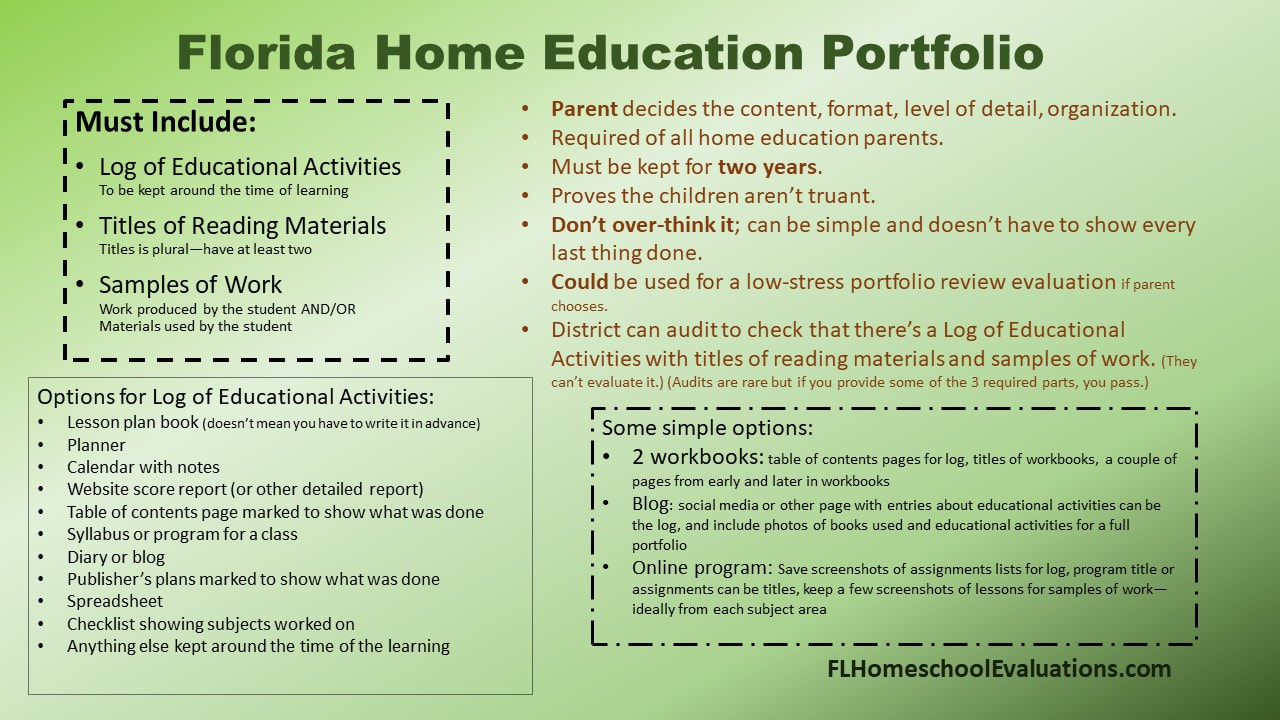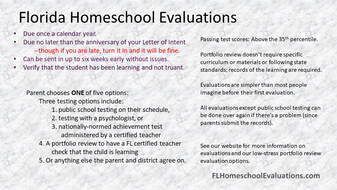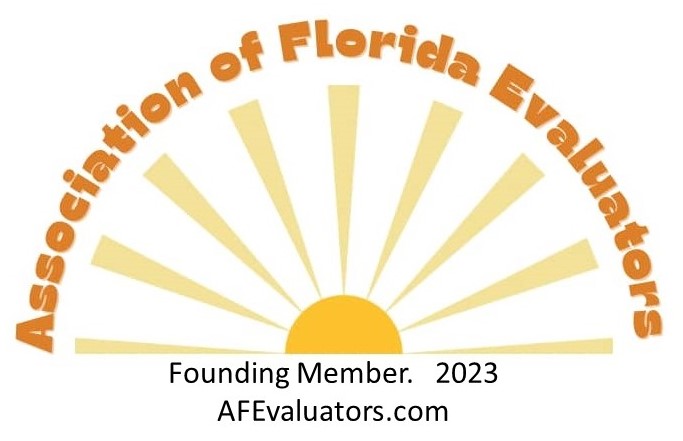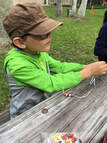Florida Home Education Laws
and
FL Department of Education (FL DOE) Policies
on
Home Education (aka homeschooling) and Evaluations
|
Florida home education laws were put into place in the 1980s to protect homeschool families while giving a way for officials to verify that homeschooled students weren't just skipping school but were getting an education. They look long and complicated by most of them are protecting homeschoolers and preventing districts from outstepping their bounds. Our graphics below summarize the portfolio and evaluation requirements while also giving practical suggestions on how to meet these requirements. Below are links to sections of Florida law relevant to home education students (the legal term for homeschooling in Florida). (More will be added at a later date. July 2022) Section 1000.21, Florida Statutes (F.S.) Gives a variety of definitions including that of a parent for purposes of education. For things like sending in a Letter of Intent and other home education paperwork, a parent can mean a parent, a guardian, anyone acting in a parental relationship, or anyone exercising authority over a student in the place of a parent. Section 1001.21, (F.S.) Office of Private School and Home Education Programs--establishes an office in the FL Dept of Education to work with home education students (and private schools) while being clear that home education students and private school students are NOT part of any Florida school districts. Section 1002.01, F.S. Defines home education (and distinguishes it from private schools) Section 1002.20, F.S. K-12 Student and Parent Rights: Defines the ages for which children must be enrolled in a Florida educational program as well as declares that a home education program meets Florida school attendance requirements and states that parents have a right to choose home education for their children. Section 1002.41, F.S. Home Education: The core of home education laws Section 1003.01(13), F.S. School attendance met by keeping home education law Section 1003.26(1)(f), F.S. Enforcement of School Attendance (regarding portfolio review requirement for students investigated for a pattern of previous nonattendance--i.e., being investigated for truancy, usually at a prior school) Section 1003.27, F.S. Court Procedures and Penalties (for truancy investigations) Section 1003.4282(7), F.S. Uniform Transfer of High School Credits (for home education students transferring to a FL public high school) Also see FLHEF.org for details on how the transfer of high school credits works. Section 1006.15, F.S. Student Standards for Participation in Interscholastic and Intrascholastic Extracurricular Student Activities; Regulation (aka Craig Dickinson Act about home education students' participation in extra-curricular activities, including sports, in Florida public or private schools) Section 1007.263, F.S. Florida College System Institutions; Admission of Students: Students who graduated from a home education program must be accepted as high school graduates if the parent or guardian signs before a notary public a form called an Affidavit of Completion. Section 1007.271, F.S. Dual Enrollment Programs Section 1009.53, F.S. Bright Futures Scholarship Program Section 1009.538, F.S. Bright Futures Scholarship Recipients Attending Nonpublic Institutions |
Florida Statutes* 1002.41 Home education programs.-- (1) As used in this section, the term “home education program” has the same meaning as in s. 1002.01. A home education program is not a school district program and is registered with the district school superintendent only for the purpose of complying with the state’s attendance requirements under s. 1003.21(1). The parent is not required to hold a valid regular Florida teaching certificate. (a) The parent, as defined in s. 1000.21, who establishes and maintains a home education program shall notify the district school superintendent of the county in which the parent resides of her or his intent to establish and maintain a home education program. The notice must be in writing, signed by the parent, and include the full legal names, addresses, and birthdates of all children who shall be enrolled as students in the home education program. The notice must be filed in the district school superintendent’s office within 30 days of the establishment of the home education program. (b) The district school superintendent shall accept the notice and immediately register the home education program upon receipt of the notice. The district may not require any additional information or verification from the parent unless the student chooses to participate in a school district program or service. The district school superintendent may not assign a grade level to the home education student or include a social security number or any other personal information of the student in any school district or state database unless the student chooses to participate in a school district program or service. (c) The parent shall file a written notice of termination upon completion of the home education program with the district school superintendent, along with the annual evaluation required in paragraph (f), within 30 days of termination. (d) The parent shall maintain a portfolio of records and materials. The portfolio must consist of the following: 1. A log of educational activities that is made contemporaneously with the instruction and that designates by title any reading materials used. 2. Samples of any writings, worksheets, workbooks, or creative materials used or developed by the student. (e) The parent shall determine the content of the portfolio, preserve it for 2 years, and make it available for inspection, if requested, by the district school superintendent, or the district school superintendent’s agent, upon 15 days’ written notice. Nothing in this section shall require the district school superintendent to inspect the portfolio. (f) The parent shall provide for an annual educational evaluation in which is documented the student’s demonstration of educational progress at a level commensurate with her or his ability. The parent shall select the method of evaluation and shall file a copy of the evaluation annually with the district school superintendent’s office in the county in which the student resides. The annual educational evaluation shall consist of one of the following: 1. A teacher selected by the parent shall evaluate the student’s educational progress upon review of the portfolio and discussion with the student. Such teacher shall hold a valid regular Florida certificate to teach academic subjects at the elementary or secondary level; 2. The student shall take any nationally normed student achievement test administered by a certified teacher; 3. The student shall take a state student assessment test used by the school district and administered by a certified teacher, at a location and under testing conditions approved by the school district; 4. The student shall be evaluated by an individual holding a valid, active license pursuant to the provisions of s. 490.003(7) or (8); or 5. The student shall be evaluated with any other valid measurement tool as mutually agreed upon by the district school superintendent of the district in which the student resides and the student’s parent. (2) The district school superintendent shall accept the results of the annual educational evaluation of the student in a home education program. If the student does not demonstrate educational progress at a level commensurate with her or his ability, the district school superintendent shall notify the parent, in writing, that such progress has not been achieved. The parent shall have 1 year from the date of receipt of the written notification to provide remedial instruction to the student. At the end of the 1-year probationary period, the student shall be reevaluated as specified in paragraph (1)(f). Continuation in a home education program shall be contingent upon the student demonstrating educational progress commensurate with her or his ability at the end of the probationary period. (3) A home education program shall be excluded from meeting the requirements of a school day. (4) Home education students may participate in interscholastic extracurricular student activities in accordance with the provisions of s. 1006.15. (5) Home education students may participate in the Bright Futures Scholarship Program in accordance with the provisions of ss. 1009.53-1009.538. (6) Home education students may participate in dual enrollment programs in accordance with ss. 1007.27(4) and 1007.271(13). (7) Home education students are eligible for admission to Florida College System institutions in accordance with the provisions of s. 1007.263. (8) Home education students are eligible for admission to state universities in accordance with the policies and guidelines of the Board of Governors. (9) Testing and evaluation services at diagnostic and resource centers shall be available to home education program students, including, but not limited to, students with disabilities, in accordance with the provisions of s. 1006.03. (10) A school district may provide exceptional student education-related services, as defined in State Board of Education rule, to a home education program student with a disability who is eligible for the services and who enrolls in a public school solely for the purpose of receiving those related services. The school district providing the services shall report each student as a full-time equivalent student in the class and in a manner prescribed by the Department of Education, and funding shall be provided through the Florida Education Finance Program pursuant to s. 1011.62. (11) A school district may provide access to career and technical courses and programs for a home education program student who enrolls in a public school solely for the career and technical courses or programs. The school district that provides the career and technical courses and programs shall report each student as a full-time equivalent student in the class and in a manner prescribed by the department, and funding shall be provided through the Florida Education Finance Program pursuant to s. 1011.62. (12) Industry certifications, national assessments, and statewide, standardized assessments offered by a school district shall be available to home education program students. Each school district shall notify home education program students of the available certifications and assessments; the date, time, and locations for the administration of each certification and assessment; and the deadline for notifying the school district of the student’s intent to participate and the student’s preferred location. (13) A school district may not further regulate, exercise control over, or require documentation from parents of home education program students beyond the requirements of this section unless the regulation, control, or documentation is necessary for participation in a school district program. *Check Florida law directly to verify as laws are updated periodically; often these are updated in Florida by July 1st. |
Always verify the law for yourself We have studied these laws in depth since 2000 and have helped thousands of families comply with Florida homeschool laws since 2003, but we are not lawyers. Check online for the latest versions of Florida laws. If you need legal counsel related to homeschooling, consider subscribing to the service of HSLDA, a group of homeschooling lawyers. Personalized Education Program
The PEP is a new option for homeschooling, effective July 1, 2023. Laws on this option will be listed later in 2023. The PEP is only for parents who have been awarded the Florida Tax Credit Scholarship and want to homeschool. (The PEP does NOT apply to the FES:UA, previously called the Gardiner, which is for special needs children. Those with the FES:UA would homeschool still under Florida's Home Education Program.) PEP laws require filing a Student Learning Plan with a Scholarship Funding Organization (SFO) and submitting test scores from an approved list of tests to the SFO in order to renew the scholarship. |








